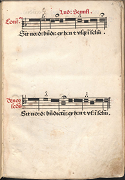Report on a four-week internship at the RISM Editorial Center in October 2020
Daniel Kneer
Thursday, August 12, 2021

The following is a report from our former intern, Daniel Kneer:
In October 2020, I completed a four-week internship in the RISM Editorial Center, Frankfurt am Main, as part of my BA in musicology. Due to my background in information technology and my musicological interest in archiving and digitization, I decided to look for a placement in the area of digital music archives.
The pandemic caused the internship, and also the staff of the Editorial Center, to forge new paths: several people completed an internship at once, and the internship took on a hybrid form with days in the office alternating with those spent working from home. On days in the office, the staff of the Editorial Center introduced themselves and explained their work through presentations and real-life examples.
At the start of the internship, we received training on the cataloging program Muscat, participated in a staff meeting, and got our longer-term projects. We each received a library catalog, which we used to add holdings to printed music, and we were handed a catalog of works from which we could add reference numbers in Muscat.
I had the catalog of the Biblioteca capitolare del Duomo in Aosta (I-AOc), published in 1985 by Giorgio Chatrian, and added the library’s holdings listed there to printed editions by composers of the 16th and 17th centuries. I also added work numbers to around 1,000 sources ascribed to Ludwig Senfl using the catalog of works by Stefan Gasch and Sonja Tröster. It was fascinating work, especially with the Senfl pieces without music incipits in the database but which had the same text, such as his Glorias. In these cases, I went from being a data creator to a database user and had to do some detective work using digital surrogates.
Stephan Hirsch gave an overview of the digital history of RISM, including the computer-based cataloging program in the 1990s, the PIKaDo system, which ran on a local network using a columnar database, and the modern Muscat system, which is based on a relational database and supports internet-based cataloging. He gave us a demonstration of a practical task and wrote a program in Ruby to extract the names of countries from all system languages that Muscat supports. Our job was to complete the list that was generated, meaning we had to make sure that a Muscat user sees a correct display of the country names (such as those that are entered for the composer’s place of origin) in each of the Muscat languages. I was responsible for the Spanish terms for countries and regions.
In addition, we got a glimpse of the public relations work that RISM does, which includes maintaining a very active community on Facebook and Twitter as well as writing blog posts on the website. For this I wrote a post marking the 253rd birthday of the composer Bernhard Romberg.
Throughout the entire internship, I had the feeling that I was truly contributing to RISM instead of simply following a flow chart. The fact that we were not working with test data but became part of the global cataloging team from the very beginning was a constant reminder to exercise care while working. My expectations to learn about the practical intersections of digital data processing and musicology were completely satisfied.
Image: Ludwig Senfl, Toni psalmorum, from the choirbook D-Mbs Mus.ms. 52, f. 2r (RISM ID 456051712).
Share Tweet EmailCategory: New at RISM

